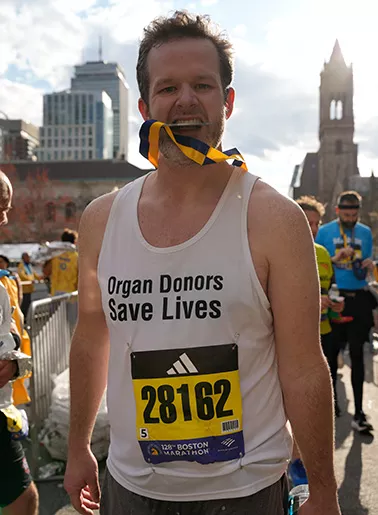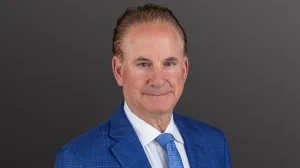
Connor Anderson had been toying with the idea of donating a kidney for a few years when he learned that his co-worker was one of the more than 100,000 people awaiting a kidney in the US each year. Despite the need, and the incredible advancements that have been made to ensure kidney donation is a safe procedure, fewer than 20,000 of those on the list will receive a life-saving donation. Connor talked it over with his wife—a nurse, and conducted his own in-depth research on kidney donation and decided to fill out the paperwork and see if he could be a match.
On Valentine’s Day 2022, Connor went to Tufts Medical Center to begin what he calls “the most intense physical exam” of his life. “I think they took 16 vials of blood,” Connor laughs. “But the Tufts Medical Center team was great and incredibly thorough. I walked out of there knowing what I needed to do. Lose about 20 pounds and watch my blood pressure.” In just a few months, Connor was as healthy as ever and ready to make his life-saving donation.
Ashtar Chami, MD, Medical Director of Kidney Transplantation at Tufts Medical Center, says donor experience has changed for the better in the 70 years since the first successful living kidney transplant between identical twins that was done in Boston. “Now we typically remove the kidney through a small incision with a procedure called laparoscopic donor nephrectomy,” Dr. Chami says. “Most donors only stay in the hospital for 1 or 2 nights.”
The surgery, conducted in September of the same year, was a success for both Connor and his co-worker. Asked to describe the recovery, Connor says that after 2 rough weeks, he was feeling pretty much back to normal. “It took longer to recover from my ankle surgery the year before.” The best feeling though, was seeing his co-worker’s health improve almost immediately, “It’s incredibly rewarding—it’s just a great feeling to be able to help.”
Connor credits the donation experience for a renewed attention to his own health, and part of the reason he signed up to run the 2024 Boston Marathon. A runner in high school, Connor’s family had received bibs for life from the One Fund after being present at finish line during the 2013 Boston Marathon bombing. “I’d been thinking about running for a few years but it felt like a great opportunity to show what organ donors are capable of.”
Asked what he would tell anyone considering applying to donate an organ, Connor says: “The worst case scenario is you get the best physical of your life, the best? You get to save someone’s life.”

